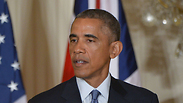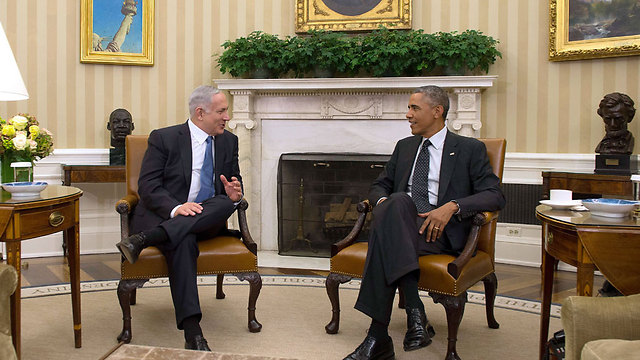
US: Alliance with Israel 'national security interest'
White House spokesman explains US policy against meeting with foreign leaders close to elections was behind Obama's decision not to meet with Netanyahu.
White House spokesman Josh Earnest explained Friday that US policy against meeting with foreign leaders close to Israeli elections was behind President Barack Obama's decision not to meet with Prime Minister Benjamin Netanyahu, stressing that the US alliance with Israel was a "clear national security interest".
On Thursday, the White House said President Barack Obama would not meet the prime minister when he comes to the US to address a joint session of Congress on Iran. The official White House explanation was that Netanyahu's visit fell too close to the Israeli election and the Obama administration wanted to avoid the appearance of taking sides.
"Prime Minister Netanyahu's visit comes about two weeks before the Israeli elections and this administration goes to great lengths to ensure that we don't give even the appearance of interfering or attempting to influence the outcome of a democratically-held election in another country," Earnest said, adding that "for that reason, the president will not be meeting with Prime Minister Netanyahu when he visits the US in March."
Earnest reiterated that Obama's decision to not hold the meeting should not be seen as a snub of Netanyahu. "The president has spent more time talking to Prime Minister Netanyahu than any other world leader. And the reason for that is simply that the United States and this president recognizes that we have a clear national security interest within our alliance with Israel."
"As a matter of longstanding practice and principle, we do not see heads of state or candidates in close proximity to their elections, so as to avoid the appearance of influencing a democratic election in a foreign country," National Security Council spokeswoman Bernadette Meehan said.
But the timing of Netanyahu's visit also gave the White House a convenient means of retaliating against the prime minister for his decision to accept an invitation from Republican leaders to address Congress. Republican lawmakers and Netanyahu worked out the arrangement without consulting with the White House or State Department, only alerting the Obama administration a few hours before the Israeli leader's trip was made public.
The White House appeared stunned by what it saw as a breach of diplomatic decorum by Netanyahu, a leader with whom Obama has a history of tension.
At the center of the maneuvering around Netanyahu's visit are the high-stakes, US-led nuclear negotiations with Iran, a nation Israel views as an existential threat.
Netanyahu and Republican lawmakers, along with some Democrats, are united in their belief that Congress should pass legislation threatening Iran with new economic sanctions if the talks break down. Obama has vigorously warned that a sanctions bill could upend the negotiations and has vowed to veto any measure that lands on his desk.
Netanyahu was originally scheduled to address Congress on Feb. 11. But the date was changed to March 3 to coincide with the prime minister's address to an annual conference held in Washington by AIPAC, the pro-Israel lobby group.
Netanyahu stands to gain politically at home from the US visit. He is in a tough fight to win re-election in Israel's upcoming March vote. Netanyahu's Likud Party is running behind the main opposition group headed by Yitzhak Herzog's Labor Party, which has been highlighting rancor in the country's critical relationship with the United States.
In 1996, then-Israeli Prime Minister Shimon Peres traveled to the US to meet with President Bill Clinton less than a month before Peres faced voters. Peres faced some criticism for using the trip as a ploy to win votes, particularly from opposition leader Benjamin Netanyahu.
"I can't find an example of any previous Israeli government whose prime minister, on the eve of elections, made a cynical attempt to use relations between Israel and the United States as a party advertisement," Netanyahu said.
Reuters and Associated Press contributed to this report.











